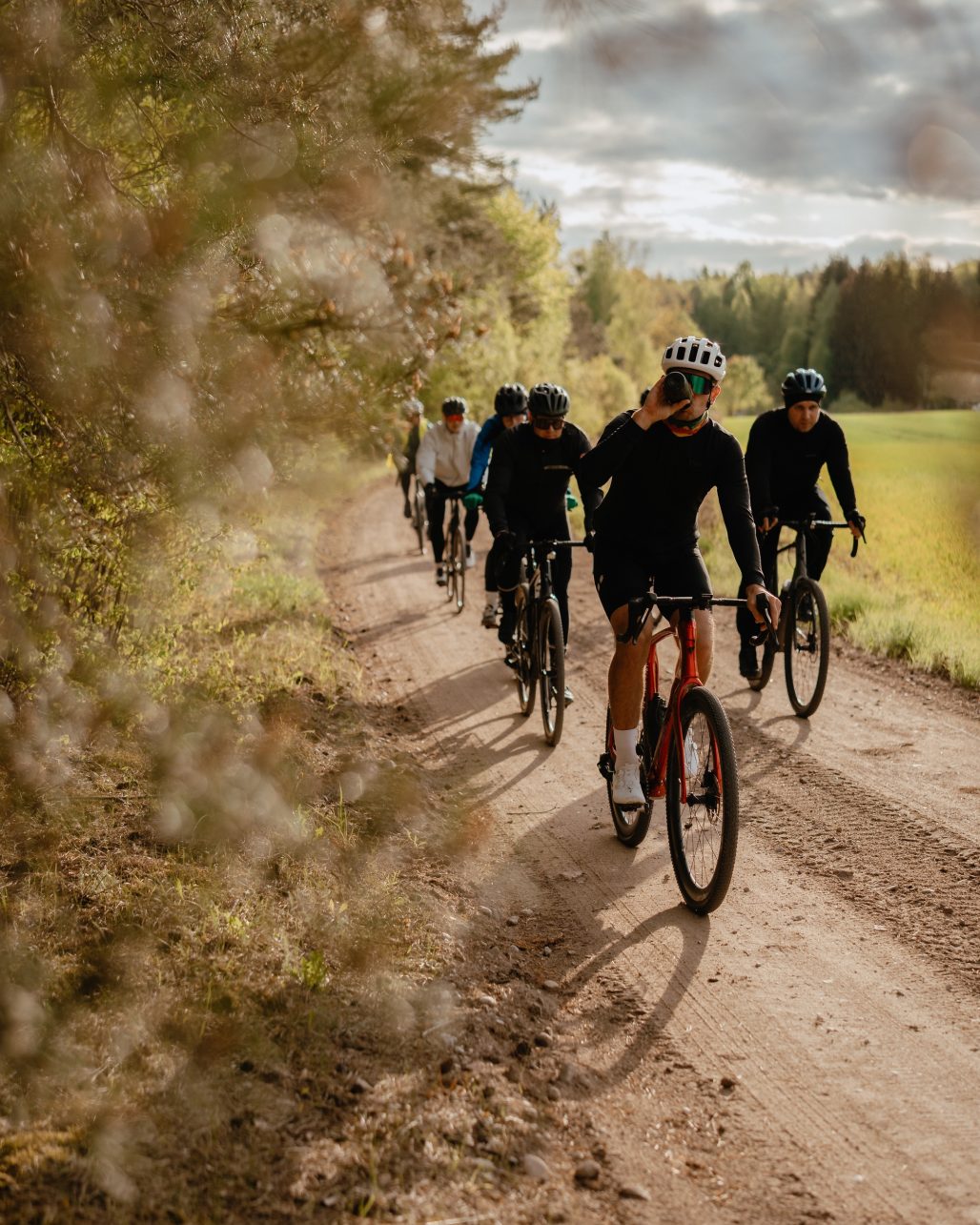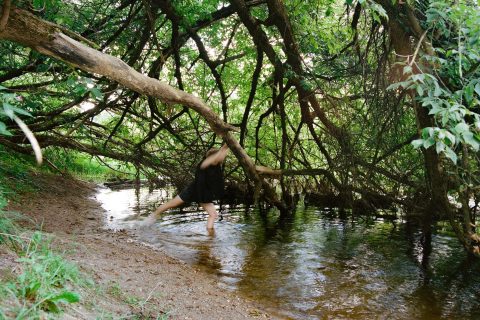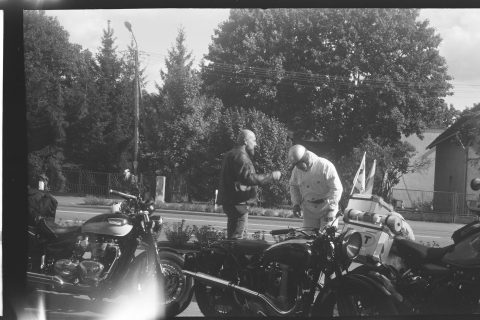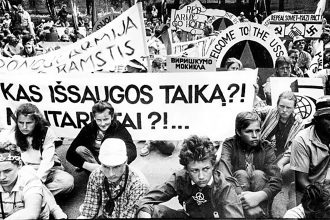Sunday. Six in the morning. You squeeze into your shorts, brush your teeth, crack three eggs into the pan, and realize the shorts are inside out after all. You rotate your ankles, knees, wrists, and wave goodbye to your sleeping family. The clips click, you stretch once more, and only when riding across the bridge do you remember you didn’t turn on Strava. It’s a bit chilly. Red light again. The kilometers tick by more slowly than you imagined last night… Especially if you’re alone.
That awkward feeling – a slow start, a fight with yourself, and finally finding a rhythm in the group – is well known to Simas Gendvila, one of the founders of the Laikra cycling club. The club, now in its second season, is based on community rides, or social rides, on road or gravel bikes on Mondays and Wednesdays. But not only then. Yet always about fifty kilometers or so, with a banana break along the way.
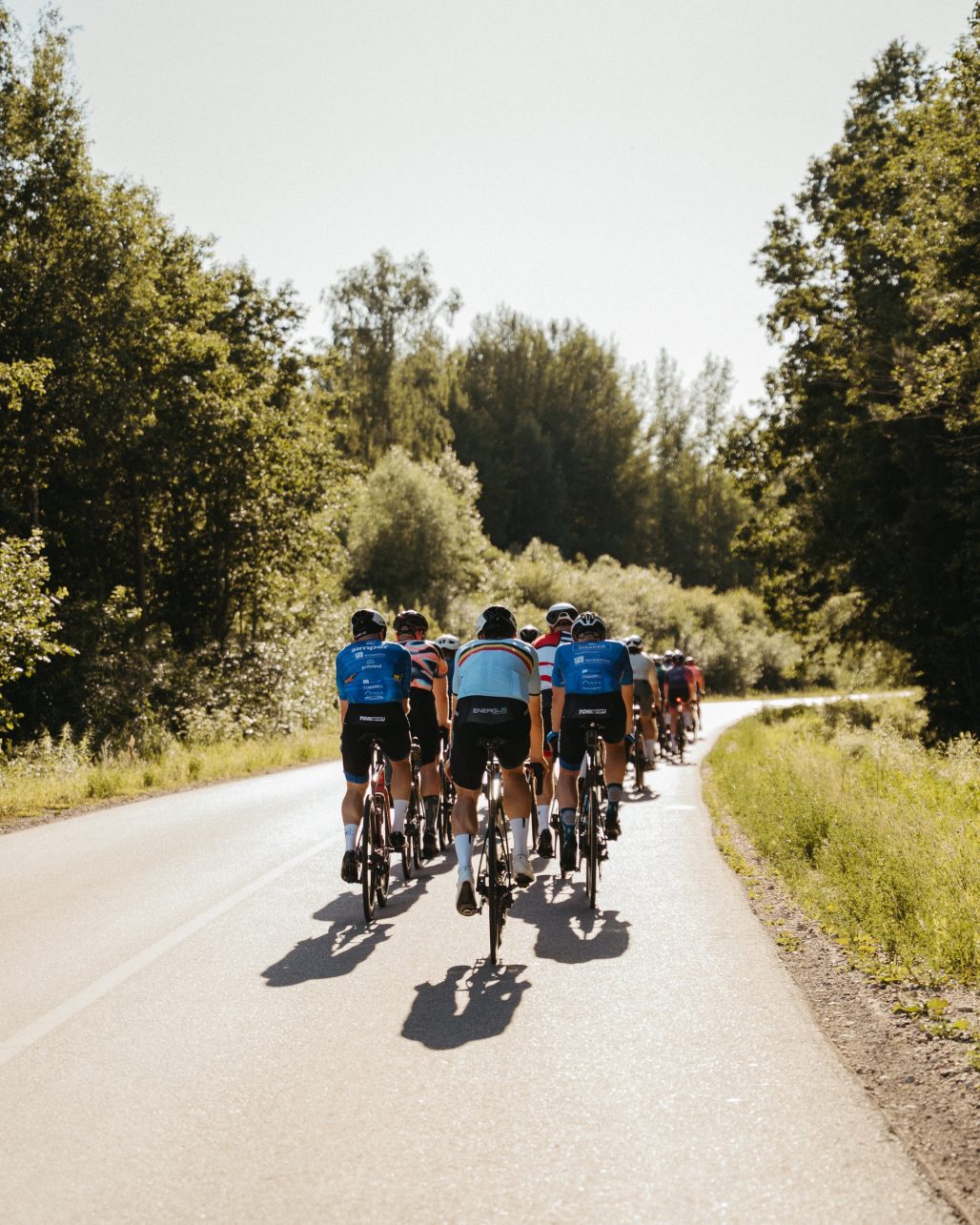
Czech bicycle polo
Simas own path into the cycling community began… in the Czech Republic. While studying sociology, he brought along a bicycle he had bought at the Aleksotas market for a semester of Erasmus in Brno, and that bike led to a friendship with a like-minded German. For the Kaunas native, who grew up in Birštonas, the fixed gear bike became not only a means of transportation but also a way into an alternative community. A means not only to ride from bar to bar but also, for example, to play bike polo.
Simas’ romance with the bicycle was put on hold by kitesurfing. More precisely, it only attempted to slow it down. “You know how it is with the wind in Lithuania – when it doesn’t blow and you want to do sports, you need to have a plan B, and that’s how I discovered gravel bikes,” he says.
The baptism of Baika and typical Wednesdays
The turning point for Simas came during the group cycling trip (bikepack) Baika Tour. He set out alone, knowing no one, having trained for distances of just 30 and 50 km, while the goal was Klaipėda–Vilnius, with an overnight stay, of course. “On the first day, I rode 286 km and couldn’t even walk anymore; I could only pedal,” he laughs as he recalls. Having pushed beyond his limits, he says he experienced how a shared goal and challenge create a sense of togetherness that propels you further.
His further search for dopamine led Simas to the Bikespot bike shop and repair service in Panemunė, from which traditional community rides – the Coffee Ride – would start every Wednesday. Though an extrovert, he admits that at first, he felt like just an observer and only gradually became part of the group. At Bikespot, he realized the value of tradition.
Opportunity in a crisis, or two bananas
When Bikespot, which had become a community center, closed, the tradition of social rides went into slumber. It’s worth mentioning Gruntadieniai: community rides that take place every Tuesday from Šančiai. But Tuesdays are not Wednesdays.
It just so happened that Simas’ partner, Bernadeta Buzaitė, and one of the most active cyclists in Kaunas, Eglė Jasiukaitytė, were working at the same co-working space at the same time. So, during breaks from Excel and Photoshop, Simas, Bernadeta, Eglė, and her decorated partner Mantas Januškevičius decided to form a new cycling club. In other words, no competition, just a need to fill the gap that had opened up. And… active work on social media, not just on Strava, but also on the platforms more familiar to ordinary people.
Although Laikra is a modern club, traditional advertising also comes in handy. For example, a Brit cycling around the Baltic Sea spotted a poster in Kavalierius and, with his bike loaded down with gear, joined the locals in exploring the Kaunas lagoon area.
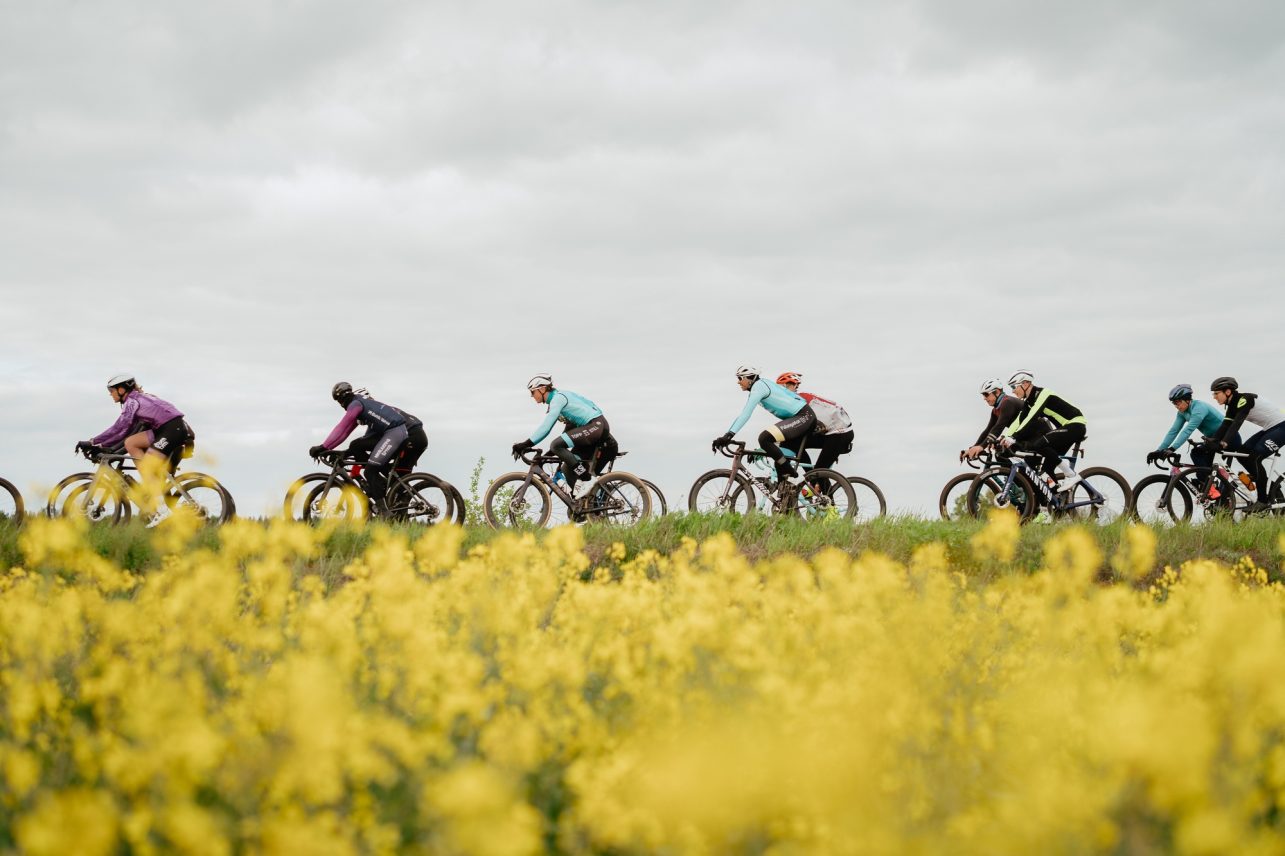
And why Laikra? Nothing special there – the name was born while fiddling with their cycling kit. “It sounds soft, it looks Lithuanian, and we entrusted the graphic side of it to designer Tadas Bujanauskas,” Simas explains. The two bananas in the logo stand for “C C,” or cycling club. Simas himself visualized them while sketching the logo in the sand. The drawn bananas quickly turned into an actual energy exchange. Laikra is famous for the fact that at every social ride, the club’s organizing committee brings bananas for the participants. Last season alone, they bought about 200 kg of them… And not all of them get eaten, so at the very least, it’s worth joining the club for the free food.
We talk about the portrait of the average banana lover. Hmm, with helmets, glasses, and Lycra, they all look alike. “We don’t want to become a closed tribe,” Simas assures us. There are no age limits. One of the most active Kaunas cyclists is a bus driver who already has grandchildren and cycles more than 10,000 km per year in his spare time. So, a flexible schedule is a real gift for cyclists. Younger people are also joining, with the average age being around 28–38. There are people of various professions, even a poet who works in the FEZ and commutes several dozen kilometers every day, decorating each finish with a quatrain.
From the club to the movement
Having started with Wednesday meetings at the O kodėl ne? bar near the railway station, this year members of the Laikra club (“members” being just a fancy word since there’s no joining fee or membership dues, you just need to show up) now gather at Pratęsimas, located in the House of Basketball, close to the confluence of the Nemunas and Neris rivers. This is also where the small Kaunas female cyclist community SheSpresso gathers on Wednesdays, which Simas always invites to ride together. So what if the speeds don’t match? You can always split into groups. The more participants, the more groups, and the more attention and support for everyone who needs it.
Neither in the same place nor in a random one – Laikra routes are carefully planned, with Simas dedicating entire days to it. Now he has just made a plan for a weekend trip to Dzūkija. According to him, by the 120th kilometer, you really start to fall in love with Lithuania. I nod in agreement – only a bicycle takes you to the most scenic clearings, the most unexpected cliffs, the most fragrant meadows. The more bridges, the more fun – Simas adds and manifests a new bridge over the Nevėžis. He is also proud of the Blokada route that he himself marked. Blokada is a race that originated during the lockdown in Vilnius, taking place across fields and forests and lasting a couple of weeks. In practice, it means that participants take on a several-dozen-kilometer route individually and can try to improve their results as many times as they want.
Critical mass
So, Vilnius comes up with something, and we adapt it? In the capital, the cycling community is several times larger, so naturally, there are more different sports and subcultural initiatives. “Kaunas is a smaller city, and it is fun to cycle here, but many people do it alone,” observes Simas, who never tires of inviting all singles to join Laikra, at least virtually.
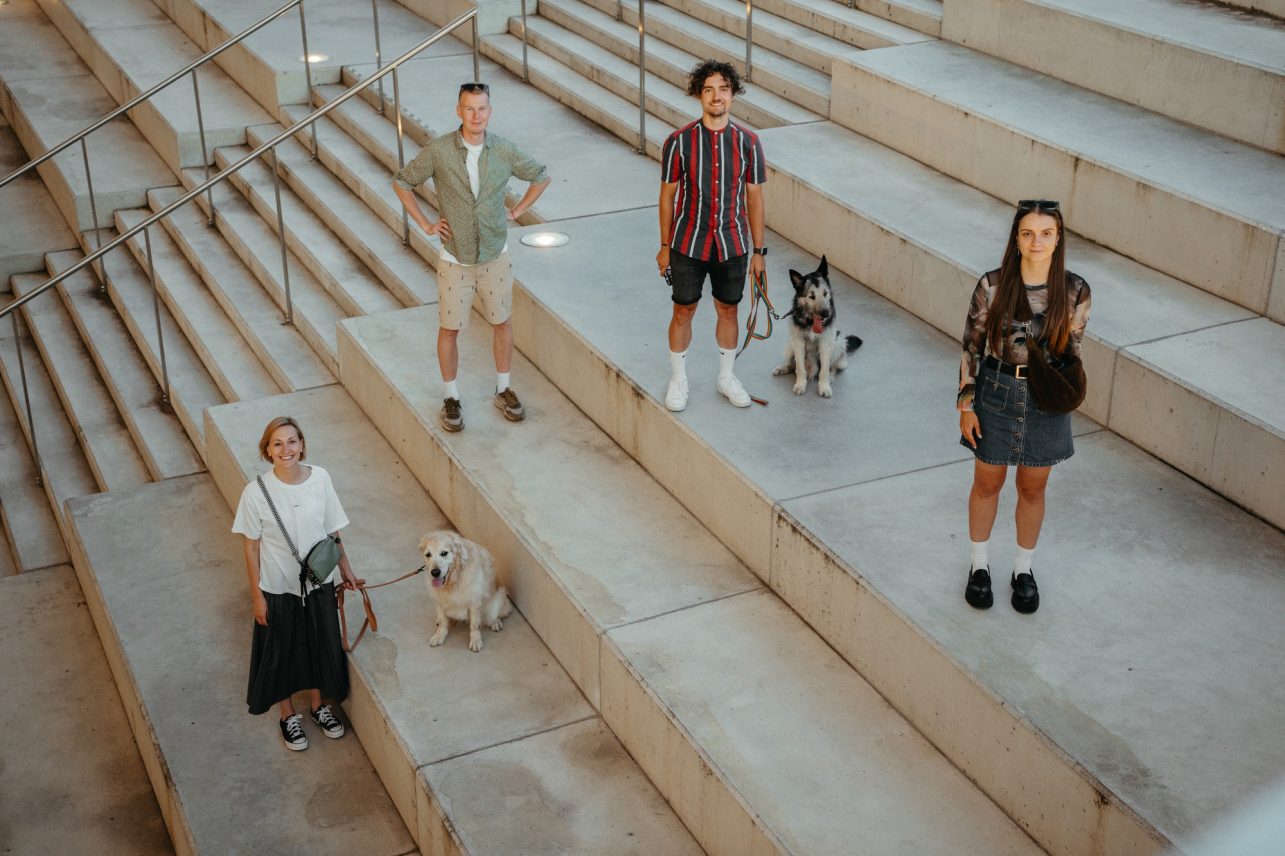
And how does a club differ from a movement? More precisely, does Laikra have ambitions to become something more than just a Facebook event? In Simas’ view, you become a movement when you take on responsibility – not only for yourself, but also for others: the slower members, safety, and the atmosphere. Bananas, cookies, water. Education is also important: the desire not only to ride, but also to share knowledge about cycling culture, safety, nutrition, and motivation. There have already been attempts, and perhaps next season there will be more.
We also remember the (perhaps only for now?) historic Critical Mass Fridays, which were partly replaced by social rides on other days of the week. It’s a global tradition to flood city streets with bicycles on the last Friday of each month, reminding people about this mode of transport. Simas has no political ambitions; he would like Laikra to remain a community club and not get entangled in writing projects and filling out reports. But he agrees that signs outside the city would be useful, reminding car drivers of the bicycle overtaking rule that has been in effect for some time. This brings us back to cycling culture – Laikra cycles with lights and helmets, while those without helmets are… well, amateurs. Think about that, if you’re one of those.
Instead of an epilogue
The season has already ended for Simas. 7 km before the finish of the Baika, he crashed into the curb, broke his collarbone, and later it turned out that he also broke his shoulder blade. So instead of personal achievements, we discuss plans and dreams.
With extensive experience in the restaurant business, Simas makes no secret of his vision: a stylish spot offering quality service, goods, community support, and good coffee. He also has a dream location – the charming, finally renovated interwar car repair shop on Kęstučio Street, near the S. Daukanto Bridge: “I’ve already figured everything out in my head, I just need an investor.”
